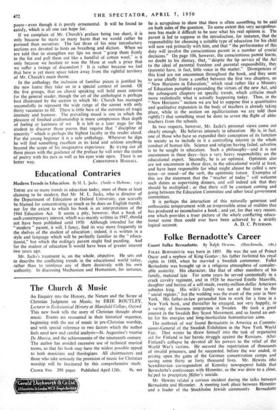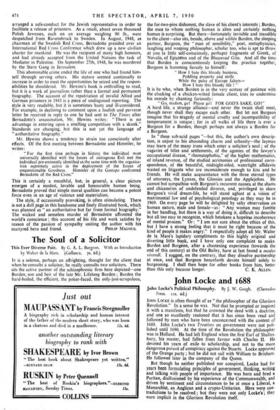Folke Bernadotte's Career
Count Folke Bernadotte. By Ralph Hewins. (Hutchinsen. t 8s.) POLKE BERNADOTTE was born in 1895. He was the son of Prince Oscar and a nephew of King Gustav ; his father forfeited his royal
rights in 1888, when he married a Swedish commoner. Folke • Bernadotte was brought up in a religious atmosphere of consider- able austerity. His character, like that of other members of his family, matured late For some years he served contentedly in a crack cavalry regiment, and in 1928 he married Estelle Manville, daughter and heiress of a self-made, twenty-million-dollar American asbestos king. His wife's family was not at that time in the "social register," but the wedding was the event of the year in New York. His father-in-law persuaded him to work for a time in a New York bank, and thereafter he engaged, not very happily, in a variety of business enterprises in Sweden. He took a great interest in the Swedish Boy Scout Movement, and so found an out- let for his energies and long-inarticulate humanitarian aims.
The outbreak of war found Bernadotte in America as Commis- sioner-General of the Swedish Exhibition in the New York World Fair. That winter he threw himself into the task of organising aid for Finland in her heroic struggle against the Russians. After Finland's collapse he devoted all his powers to the relief of the World War's victims. He secured the repatriation of thousands of invalid prisoners, and he succeeded, before the war ended, in prising open the gates of the German concentration camps and saving some thirty or forty thousand lives. Mr. Hewins (the Scandinavian correspondent of Kemsley newspapers) holds that Bernadotte's conferences with Himmler, as the war drew to a close, h-eped to precipitate ,Hitler's suicide.
Mr. Hewins relates a curious incident during the talks between Bernadotte and Himmler. A meeting took place between Himmler and a leader of the Stockholm Jewish community. Bernadotte
arranged a safe-conduct for the Jewish representative in order to facilitate a release of prisoners. As a result, about seven thousand Polish Jewesses, each on an average weighing 90 lb., were despatched from Ravensbruck to Sweden. In August, 1948, as chairman of the Swedish Red Cross, Bernadotte presided over an International Red Cross Conference which drew up a new civilian charter for mankind. He was the recipient of many high honours, and had already accepted from the United Nations the task of Mediator in Palestine. On September 27th, 1948, he was murdered by the Stern Gang in Jerusalem.
This abominable crime ended the life of one who had found him- self through serving others. His stature seemed continually to increase in order to meet the opportunities he seized and the respon- sibilities he shouldered. Mr. Hewins's book is enthralling to read, but it is a work of journalism rather than a formal and permanent biography. The account of the repatriation of invalid Allied and German prisoners in 1943 is a piece of undisguised reporting. The style is very readable, but it is sometimes hasty and ill-considered. For example, in declining to comment upon a foolish and perverse letter he received in reply to one he had sent to The Times after Bernadotte's assassination, Mr. Hewins writes: "There is no advantage in entering upon a smelling competition with a skunk." Standards are changing, but this is not yet the language of "authoritative biography."
Mr. Hewins shows a tendency to strain too consciously after effects. Of the first meeting between Bernadotte and Himmler, he writes: " For the first time perhaps in history the individual most universally identified with the forces of outrageous Evil met the Individual pre-eminently identified at the same time with the organisa- tion supremely active in the deployment of the forces of unquestionable Goodness. Himmler of the Gestapo confronted Bernadotte of the Red Cross."
This is certainly a mouthful, but; in general, a clear picture emerges of a modest, lovable and honourable human being. Bernadotte proved that simple moral qualities can become a potent force even in an age of violence and materialism.
The style, if occasionally provoking, is often stimulating. Thera is not a dull page in this handsome and finely illustrated book, which was planned as "an authoritative but far from formal biography." The wicked and senseless murder of Bernadotte affronted the world's conscience ; this account of his life and work satisfies by reason of the passion of sympathy uniting the author with his







































 Previous page
Previous page